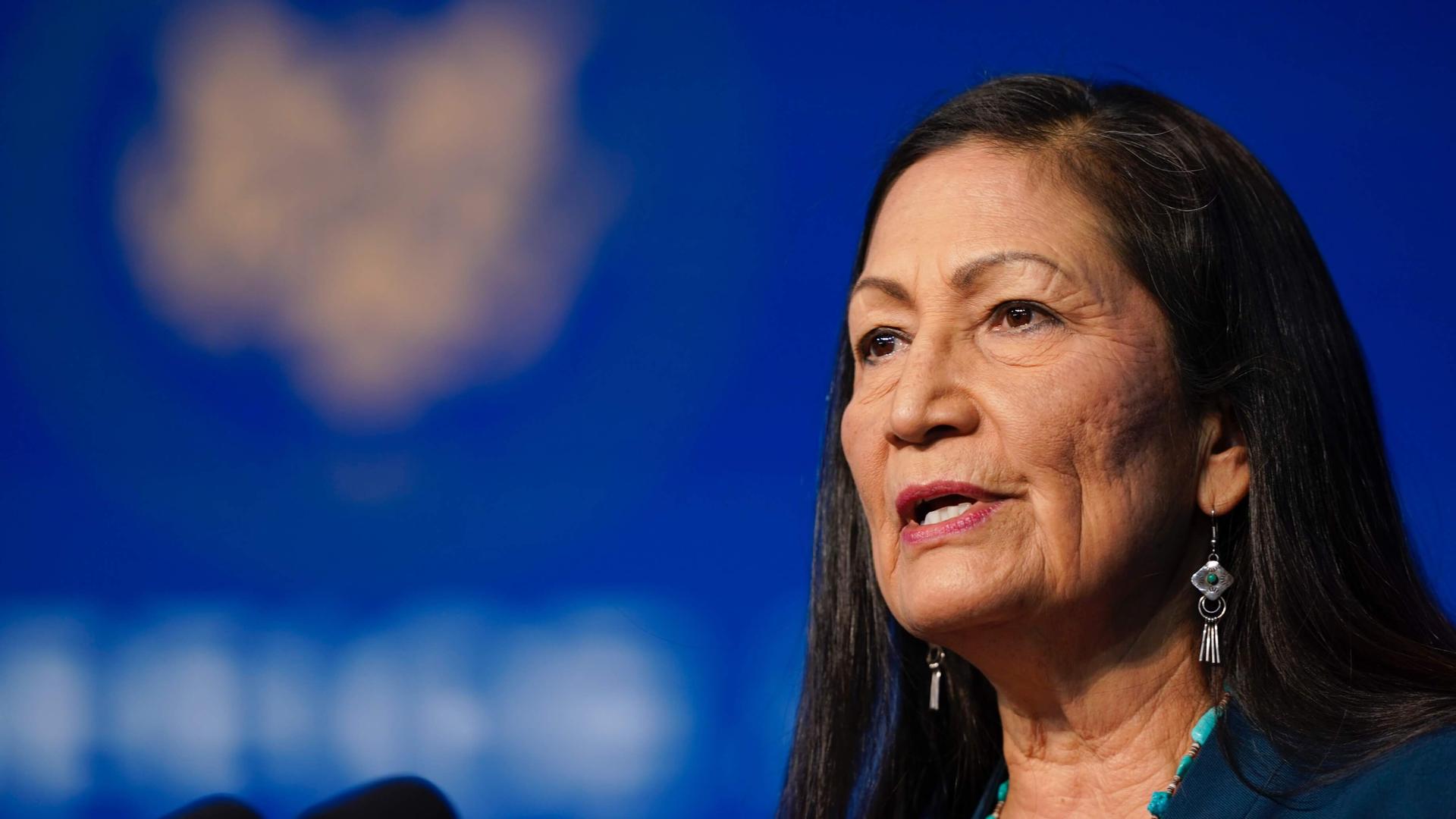Deb Haaland, Biden’s interior secretary nominee, says she’ll be ‘fierce for our planet’
President Biden has chosen Democratic Rep. Deb Haaland to be the next secretary of the interior.
Rep. Haaland represents New Mexico’s 1st Congressional district and, if confirmed, she will be the first Native American to run the Department of the Interior, which oversees the Bureaus of Indian Affairs and Indian Education, as well as wildlife protections and public lands that cover roughly one-fifth of the nation.
Related: How Biden’s Keystone XL Pipeline cancellation could test US-Canada relations
As a member of the Laguna Pueblo tribe, Haaland often says she’s proud to trace her ancestry back 35 generations on the land that much more recently became the state she represents.
As a child, Haaland moved around the country a lot, with parents who served in the Navy and the Marine Corps, before returning to her family’s ancestral homeland in her teens. Her political career began somewhat late in life, but is grounded in her years of organizing Native peoples.
Related: Biden-Harris ticket makes history on climate and environment
“When I was organizing in Indian Country, I cooked a lot of food. That’s something that you can get people to come out for. … The big pots of green chile stew sometimes went a long way with the work I was doing and getting volunteers to show up for me.”
“My entry into politics really came as an adult because I just wanted more Native Americans to vote,” Haaland says. “When I was organizing in Indian Country, I cooked a lot of food. That’s something that you can get people to come out for. I realize it’s different in so many communities, but I loved being in Indian Country because I know what it’s like to be Native and I know what it’s like to converse with folks in those communities. … The big pots of green chile stew sometimes went a long way with the work I was doing and getting volunteers to show up for me.”
Related: Native American Congresswoman-elect Deb Haaland is ready to get to work
Chiles also helped put food on the table. While Haaland worked her way through law school as a single mom, she started a salsa company called Pueblo Salsa to earn some extra income.
“[I]n this day and time, in the middle of a pandemic, with economic struggles and environmental injustice, we need folks who are ‘close to the pain,’ as my dear friend [Rep.] Ayanna Pressley says.”
“I lived paycheck to paycheck, just like everybody else, and I never even had a savings account,” Haaland says. “I know what it’s like to be on food stamps, I know what it’s like to piece together health care for me and my child. And so I feel like, in this day and time, in the middle of a pandemic, with economic struggles and environmental injustice, we need folks who are ‘close to the pain,’ as my dear friend [Rep.] Ayanna Pressley says. And so I count myself as sort of an everyday person who worked really hard and ran for Congress and won.”
Related: 5 ways Trump and Biden diverge on climate issues
In her first term, Haaland co-sponsored the Green New Deal and made Native American issues a focus, sponsoring bills on everything from tribal broadband access to nutrition to COVID-19 relief for tribes. Rep. Haaland also sponsored the Thirty by Thirty Resolution to Save Nature to conserve 30% of America’s lands and waters by 2030, something President Biden has said he supports. And she co-sponsored a bill that would protect Chaco Canyon, a sacred ancestral homeland to the Pueblo people, from nearby oil and gas development.
Related: Supreme Court recognizes Native sovereignty in much of Oklahoma
In 2018, after her historic election to Congress, Rep. Haaland credited the women in her family for teaching her about resilience.
“My grandmother used to clean diesel train engines with a bucket of kerosene and a brush. She worked the midnight shift. She kept the trains in Winslow, Arizona, running on time. So, I just feel like I come from this long line of very strong women.”
“When I think about my grandmother, who, [with] my grandfather, moved to Winslow, Arizona, to work on the railroad — that was part of the assimilation policies of our US government back in the early 1900s,” Haaland says. “They moved probably in the late teens. My grandmother used to clean diesel train engines with a bucket of kerosene and a brush. She worked the midnight shift. She kept the trains in Winslow, Arizona, running on time. So I just feel like I come from this long line of very strong women — my grandmother, my great-grandmother, my mom, who is a Navy veteran and still lives out at Laguna today; so I hopefully will make my mother and my grandmother proud.”
And when Rep. Haaland gave a speech accepting her nomination for secretary of the interior, she again thought of her mother.
“Growing up in my mother’s Pueblo household made me fierce,” Haaland says. “I’ll be fierce for all of us, for our planet and all of our protected land, and I’m honored and ready to serve.”
This article is based on an interview by Jenni Doering that aired on Living on Earth from PRX.
Our coverage reaches millions each week, but only a small fraction of listeners contribute to sustain our program. We still need 224 more people to donate $100 or $10/monthly to unlock our $67,000 match. Will you help us get there today?
